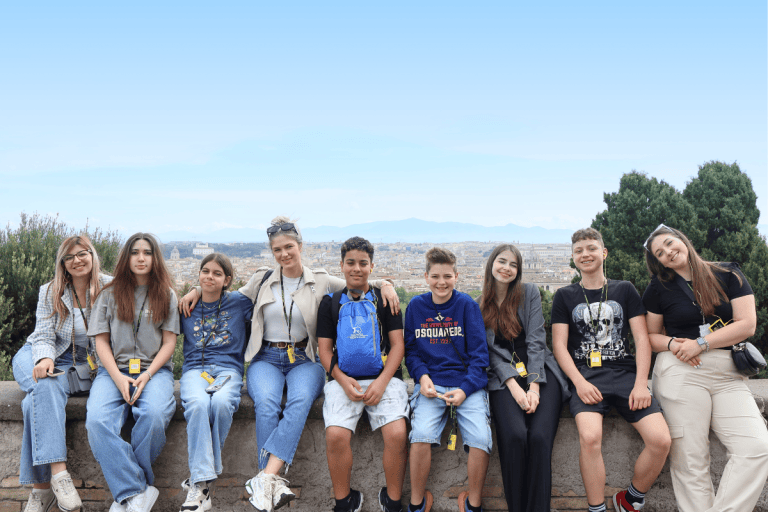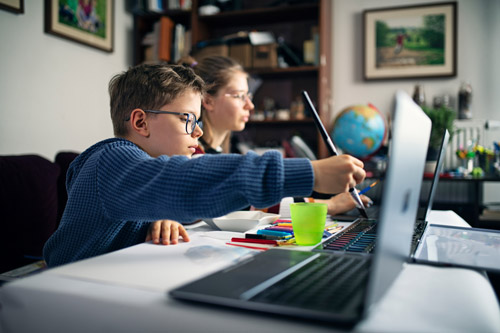When people think of online education, one of the first concerns that arises is whether students miss out on social experiences. However, socialization for online students, especially in our online K-12 school, is not only possible but also thriving in new and meaningful ways.
How Do Online K-12 Students Socialize?
Parents often see as a sort of an issue the fact that online schools don’t have the aspect of socialization.
Although we can’t argue with that, we don’t see it as an issue or a shortage.
Our main goal at online school is to provide education for students.
Additionally, our learning methodology leaves students with plenty of time to develop and nurture friendships “outside” of the school.
That said, our school doesn’t ignore its problems and works on solving them the best way it can.
“Meet and Greet” School Trips around the World

Once or twice a year, we organize school trips for our students where tutors and students can meet in real life!
While online learning offers great flexibility, we also believe it’s important for students to build real-life friendships and enjoy time together outside the digital world.
It involves trips around museums or fun activities such as skiing in the winter or beach in the summer.
These trips connect children around the world and help create long-term friendships.
Group Classes That Encourage Interaction
One of the main ways online students can interact with each other is through live group classes.
These sessions are designed to mimic traditional classrooms where students can:
- Participate in real-time discussions;
- Work on collaborative projects;
- Practice communication and presentation skills.
Group classes help build a sense of community, allowing students to interact regularly with peers and form bonds over shared experiences.
Group classes, at least in some online schools, such as our school EduWW, are not mandatory but it is recommended to participate for this very reason.
Discussion Boards and Distance Learning Platforms
Almost all online schools use dedicated learning management systems where students can commute outside of live sessions.
These platforms include:
- Forums and chat spaces;
- Peer-to-peer feedback opportunities;
- Shared multimedia projects and polls
These features promote continuous interaction and allow students to express themselves freely and discuss various school related topics, forming online friendships and developing teamwork skills.
3. Student Clubs and Extracurricular Activities
Another key contributor to socialization for online students is participation in student-led clubs.
These clubs cater to a wide range of interests, from STEM and coding to art, music, and book discussions.
Benefits include:
- Meeting peers with similar passions via online clubs lead by tutors who specialize in club’s activities;
- Developing leadership and organizational skills
- Sometimes participating in contests, showcases, or performances
These virtual clubs offer students a chance to grow outside academics while connecting on a personal level with others from around the globe.
The Hidden Social Benefit: More Free Time
One of the unexpected advantages of online schooling is the freedom it gives students to socialize on their own terms.
Students like online school because it doesn’t require as much time as a regular one. That gives them extra free time to do something else that they like.
We always advise parents to help their children discover hobbies and other interests and pursue them. With online school, they will have plenty of time to do that.
For example, some of our students are young actors, dancers, and athletes.
At the same time, students form friendships with peers who share the same interests as them.
Additionally, having a hobby or other interests can significantly improve the lives of young students and help them develop new skills that will benefit them in the future.
With no time lost on commuting or rigid school schedules, students gain hours each day that they can spend:
- Engaging in hobbies and sports;
- Joining local clubs or volunteering;
- Hanging out with friends in their community
This self-paced model empowers students to find authentic social connections, with people who truly share their interests, values, and goals.
Classroom vs. Individual Learning
We can’t deny the benefits of learning in an environment full of children who are the same age. Some children indeed make life-long friendships in schoolyards.
However, there are other, not so pleasant memories that children take from school. It is not unheard of that many students are dealing with peer violence and other problems. We can’t ignore negative experiences that can significantly affect students and their life in general.
At online school, they will not have such problems.
They can build friendships with children who share the same interests as them in other areas outside of the school.
Such friendships tend to be stronger because children share the same values and have a lot more in common than merely the fact that they spend 6-8 hours a day in the same classroom.
Conclusion
Contrary to common myths, socialization for online students is not lacking but evolving.
Through group classes, digital discussion spaces, and a diverse range of club activities, students in online K-12 schools build meaningful relationships while developing essential life skills.
And with more time to explore passions offline, they enjoy a flexible and fulfilling educational journey.



